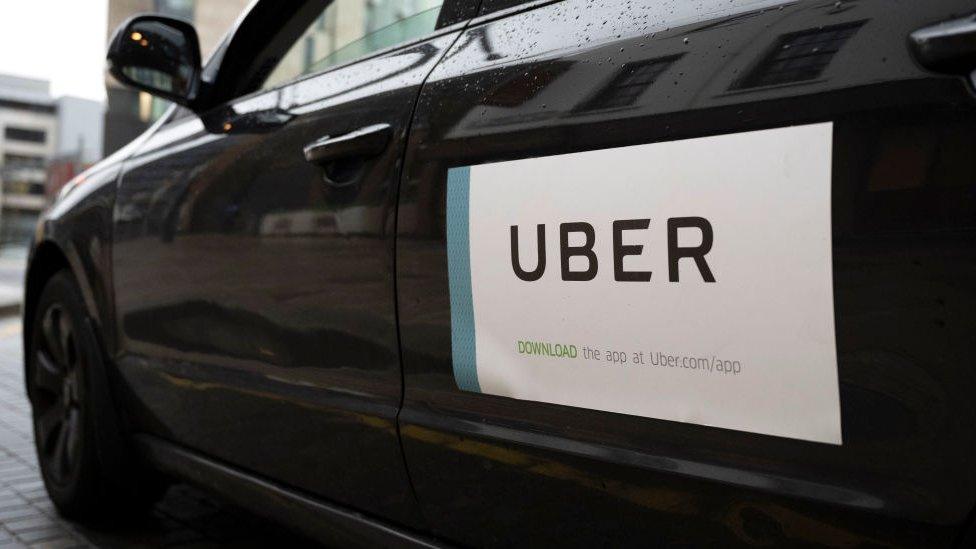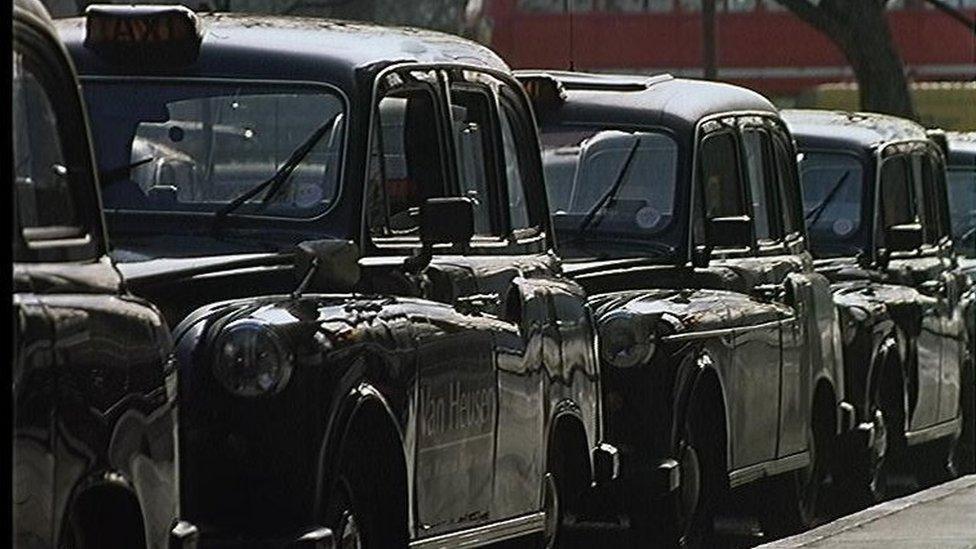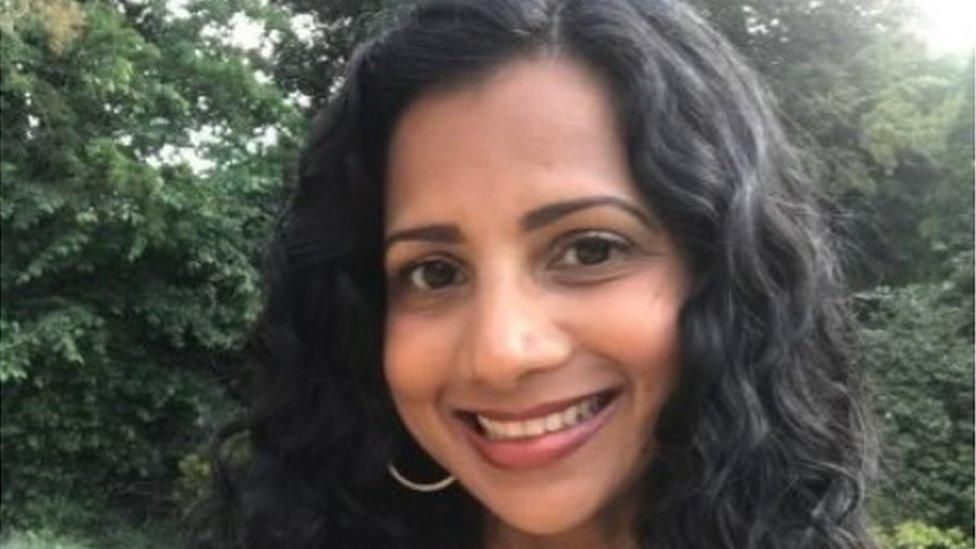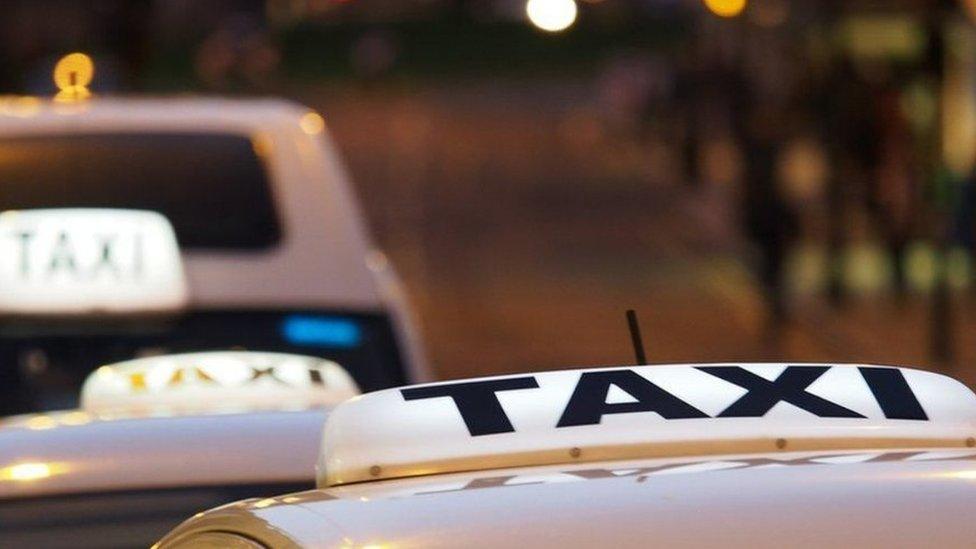London minicab drought: Poor pay rates or spike in demand?
- Published

Uber drivers have told the BBC the lack of cabs is down to low pay - a claim the firm rejects
A minicab drought is afflicting passengers, with scores of social media complaints of rides being unavailable or cancelled at the last minute.
Drivers in London say poor rates after a switch in pay levels last Christmas mean up to 80% of journeys are being turned down.
But Uber, the capital's biggest minicab operator, says any issues are being caused by a spike in demand.
It said it was trying to recruit 20,000 more drivers to address this.
However, Uber driver Mehmet, a member of the App Drivers & Couriers Union (ADCU), said the pay-rate change last year was a key reason people were finding it harder to get a cab.
The company's rides are now being set at a fixed price of £1.25 a mile, Mehmet said - well below the £2 break-even point for drivers.
It is lower than the £1.50 rate he was getting in 2017, he added - and well below the £4 black cabs charge - which he says is leading to a spike in journeys being turned down by drivers.
Allow X content?
This article contains content provided by X. We ask for your permission before anything is loaded, as they may be using cookies and other technologies. You may want to read X’s cookie policy, external and privacy policy, external before accepting. To view this content choose ‘accept and continue’.
"I'm part of a Facebook group of about 600 drivers," Mehmet said. "Rejection rates are about 75-80% at the moment.
"Uber is sending us £8 fares for journeys through central London that take an hour and 15 minutes with speed restrictions and diversions.
"In my 17 years as a driver these are the lowest fares I've had and it's really damaging our earnings."

The Licensed Taxi Drivers Association, which represents black-cab drivers, says it is "crystal clear" why some private-hire drivers are struggling
Another Uber driver and ADCU member, Hadi, agreed, saying London has some of the lowest fares in the UK. He told the BBC fares had been cut four times since 2014, meaning drivers could no longer afford to take many passengers.
"We're talking about 80% (of fares) being rejected," he said.
"Drivers are looking at some of these prices and thinking, 'it's not worth it, so I'm not going to take it'.
"Customers are complaining they cannot get home but the drivers don't set the rates. It's not the drivers that should be blamed, it's Uber, but when we ask them for £2 a mile it's falling on deaf ears."
'It's almost impossible to get an Uber'

Shweta Aggarwal says she was left stranded when her Uber was cancelled
Shweta Aggarwal, who lives in the Hertfordshire commuter town of Rickmansworth, normally gets an Uber into central London about once a fortnight.
She said she had noticed a shift away from drivers being keen to pick up a longer fare like hers.
"Ubers are cancelling on you more and more. They say they're coming but then you're left stranded. Our friends in central London also say it's almost impossible to get an Uber and there's literally no choice.
"When it comes to Uber they've definitely become more unreliable and there's a point at which it's not worth it and we'll just get a train instead."
Allow X content?
This article contains content provided by X. We ask for your permission before anything is loaded, as they may be using cookies and other technologies. You may want to read X’s cookie policy, external and privacy policy, external before accepting. To view this content choose ‘accept and continue’.
Steve McNamara, who represents black-cab drivers through the Licensed Taxi Drivers' Association, said plenty of drivers and cabs were available but excessively low rates in the minicab industry were disrupting the trade.
"We're aware that some of the private-hire companies are having enormous trouble covering work and the reasons for that are crystal clear," he said. "Many are working incredibly long hours for little pay.
"The irony for us is people are now screaming all over social media because they can't get the dirt-cheap luxury transport they have become accustomed to."
Mr McNamara added that the drop in black-cab numbers - there are nearly 10,000 fewer black cabs in London than there were in 2011- was partly due to the switchover to electric vehicles and a move towards multiple drivers sharing a vehicle between shifts.
What does the data show?

Thousands of private-hire drivers have joined the ranks in the past decade
There has been a big increase in the overall number of vehicles and drivers available for hire over the past decade, according to Transport for London (TfL) statistics.
The TfL figures indicate there are about 14,000 more vehicles available for hire, and nearly 40,000 more drivers on the streets of the capital, compared with 10 years ago.
That's despite the fall in the number of black cabs in London and a drop in black-cab driver numbers - there are about 4,550 fewer drivers than there were in 2011.
There has, though, been a rise in the number of private-hire vehicles, commonly known as minicabs, of just under 24,000.
Although the number of minicab operators has dropped by a third in the past 10 years, from nearly 3,000 to just under 2,000 - competition has driven many out of business - more than 41,000 minicab drivers had joined the ranks by 2020.
However, there was a drop of about 17,000 minicabs, and nearly 6,500 minicab drivers, between March 2020 and April 2021 - figures that cover the bulk of the pandemic.
Allow X content?
This article contains content provided by X. We ask for your permission before anything is loaded, as they may be using cookies and other technologies. You may want to read X’s cookie policy, external and privacy policy, external before accepting. To view this content choose ‘accept and continue’.
Steve Garelick, GMB's London organiser, said the union was "working closely to create a better deal" with the minicab drivers.
Mr Garelick also claimed the latest figures showed Uber drivers earned, on average, more than double the London living wage.
Uber rejected claims that low earnings were to blame for any shortages, and said drivers were making £24.53 per hour.
It said that the recently introduced pricing system gave drivers the ability to see how much they would earn per trip.
"The vast, vast majority of drivers prefer it as it gives them more power. This, combined with too much demand, has meant that drivers can pick the best jobs," an Uber spokesman said.
He added: "We have seen a huge spike in demand since the end of lockdown, and in many cities are now seeing demand 20 to 40% higher than it was before the pandemic.
"There are about 70,000 drivers working on the app today in the UK, which is similar to the number before the pandemic, but due to the high demand for our service we are also actively recruiting 20,000 more."
Private-hire firm Addison Lee also says it is on a recruitment drive. It wants to take on 1,000 more drivers in London and says it is offering a "market-leading" package.
"It's encouraging to see London reopening and the city coming back to life," chief executive Liam Griffin said.
"Drivers will have a huge role to play in helping people getting around the city as safely and reliably as possible."